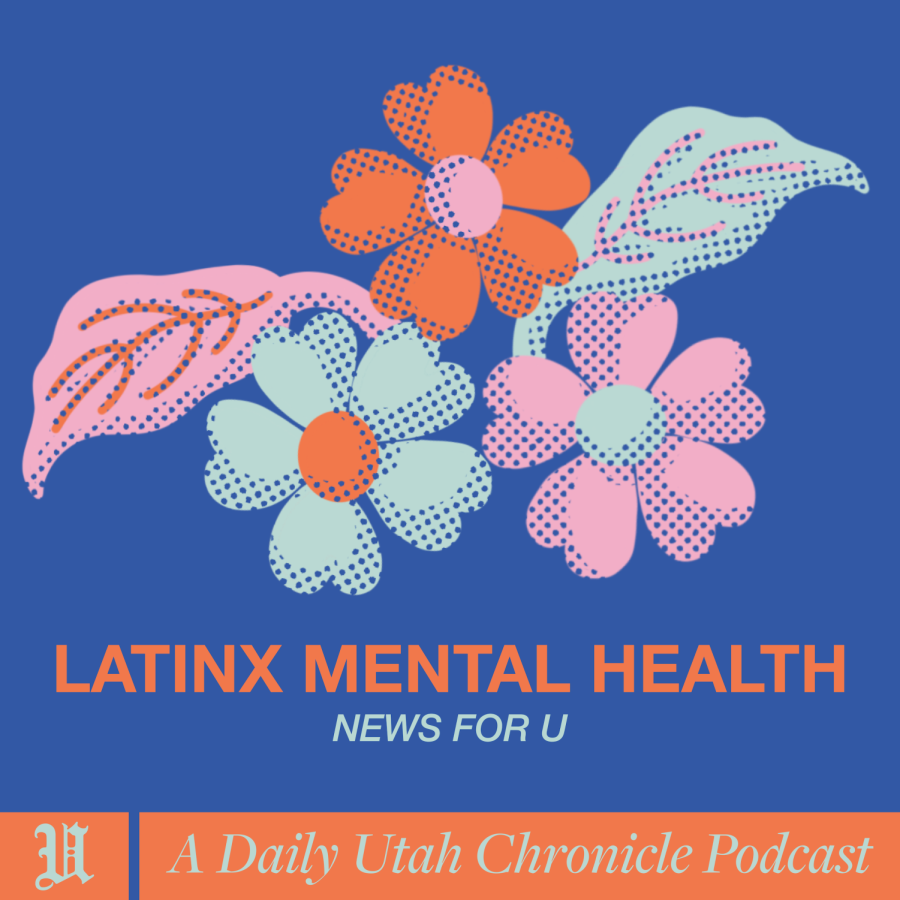News for U — Episode 5: Latinx Mental Health Workshop Series
(Graphic by Sydney Stam | The Daily Utah Chronicle)
March 27, 2023
Read Jake’s story here.
Theadora Soter 10:54:31
Hello and welcome back to News for U, The Daily Utah Chronicle podcast, I’m Theadora. In this week’s episode of the podcast we’re going to talk about the new series on Latinx mental health. Jake Duffy has joined us today to discuss with us in more detail what occurred. Hey, Jake, thanks so much for joining us.
Jake Duffy 10:54:47
Hey, thank you.
Theadora Soter 10:54:49
So can you tell us a little bit about yourself and what you do here at the Chronicle?
Jake Duffy 10:54:52
Yeah, so I’m a senior at the U studying political science. I joined the news desk this year at the beginning of January. And that’s what I’ve been doing.
Theadora Soter 10:55:03
Cool. Cool. So the last article you wrote was about a new workshop series about mental health for students of Latinx descent. Can you tell me a little bit about the background of the series? Who started it? When did the first session take place? How many more sessions will there be stuff like that?
Jake Duffy 10:55:20
Yeah, so the Latinx mental health series is a collaborative project. It started as a collaboration between the Latinx Student Union, the U’s Counseling Center, the Center for Equity and Student Belonging, also known as CESB, and the Dream Center, with the Sonos Dreamers organization, which is a organization that advocates for undocumented students. Really the purpose is for it to kind of be a gathering space for people to discuss mental health, and then zero in on the specifics of , kind of, the mental health of Latinx students. So, the first session was on March 2. I attended the second session, on anger. There’s two more on Thursday, March 30, from 4 to 6 p.m., and then April 13, which is going to be a panel discussion about Latinx mental health.
Theadora Soter 10:56:10
That’s awesome. Um, so according to your article, the session that you went to was called “The Anger We Carry.” It was a roundtable discussion talking about anger. What were some of the causes, reasons and variations of anger experienced by students in the Latinx community that were brought up?
Jake Duffy 10:56:28
Yeah, so the conversation was really interesting because it kind of began talking about anger more generally and then zeroing in on that. I think what I was super captivated by was that a lot of the causes and reasons for anger stemmed from stigmatization and profiling and, kind of, general disconnects between immigrant families and first generation students. So, I think two good examples were like machismo culture for Latin men, and then the “spicy Latina” stigma for women. And then also conversations on what it’s like to be a queer person inside of a Latinx household. And then also just a general kind of frustration that a lot of young people or first generation people have with their parents not maybe understanding their particular experiences. Yeah.
Theadora Soter 10:57:17
So are those stereotypes kind of placed by students outside of the Latinx community, but within the University of Utah community?
Jake Duffy 10:57:25
Yeah, that’s probably the most interesting thing, is that it comes from both sides, I think …
Theadora Soter 10:57:30
Interesting.
Jake Duffy 10:57:30
… People talked about how a lot of those stigmas are external, so how society perceives them. But an equal amount of attention was being paid to how students feel like their parents will invalidate their anger or their frustration, because they didn’t experience maybe the difficulties of crossing the border or living in a country that just does not have as many resources.
Theadora Soter 10:57:55
Right. So, you kind of talked about the next session, and the ones after that, which sound really interesting. When and where are these held? And how do you, kind of, get to be a part of them?
Jake Duffy 10:58:07
The next one is going to be held in the Unity Lounge, which is inside of the Student Lounge from 4-6 p.m., the next one is. Then the last one, which I think I said was April 13, is going to be at the Dream Center.
Theadora Soter 10:58:20
Okay.
Jake Duffy 10:58:21
Which I think will be from 5-7 p.m. So yeah, the Student Lounge is where the next one is going to be. And then the Dream Center is where the final meeting will be.
Theadora Soter 10:58:29
Awesome. What’s kind of like the vibe of these meetings? Are they welcoming? Like, do you feel like they were a safe space? Would you recommend that people go check them out?
Jake Duffy 10:58:38
Yeah, I think that I was definitely a little bit intimidated — I had been with some of the stories that I’ve chosen to cover, because I’ve been entering spaces that are not directly for white men. This environment though, I was very, very, kind of, pleased and happy to be there. Because I was really welcomed with open arms. The vibe was very chill. They had some Latin music playing. They were sharing snacks. Everyone was mingling and talking. And, again, it was a mixture of all different people from different backgrounds. So, there were white students, there were Asian students, there were Latinx students, of course. So, they encouraged me to not only observe but also participate and made it very clear to me that, while I might not be a part of this community, they wanted me to be there, which was super awesome.
Theadora Soter 10:59:24
That’s very cool. Um, I guess I’m kind of just curious about kind of like the setup of the actual meeting.
Jake Duffy 10:59:30
I’d say it was definitely a little bit of both. I think the conversation was moderated by two, what they call, embedded therapists, the University Counseling Center. From there, there were just kind of discussion points of them asking, “What is anger? What does anger look like to you? How do you handle anger?” and then zeroing in on the questions about, “What is your anger as a Latin individual? Where do you think that anger comes from? What do you feel? What are the particular problems that exist for you as a Latinx person?”
So, with those kinds of questions that were put out, there’d be a roundtable discussion of people just kind of raising their hands and sharing the space and just kind of opening themselves up. And as time went on, this was like a two hour meeting, and so, as time went on, people became way more willing to open themselves up and talk more, which was super good, because I think that people started to really become more vulnerable and really access that kind of nitty gritty conversation topics or ideas that you kind of need to open yourself up to really talk about. So, yeah, roundtable discussion and there was kind of topics that were given throughout the event.
Theadora Soter 11:00:45
This was kind of put on by the Latinx Student Union, which you kind of talked about, can you tell us a little bit about what that is and what services it provides for students of Latinx heritage beyond the mental health workshop?
Jake Duffy 11:00:58
Yes, I was able to speak with one of the event coordinators, Jasmine. The Latinx Student Union was created in, I think, in the spring semester of 2022. It’s largely a meeting place for Latin students across the board. It really exists for students to enjoy cultural activities, have a sense of community on campus. It really serves to kind of build and dignify a Latin community and experience on campus. So, the Latinx Student Union, in relation to the U, is really a place where people can come together to kind of see and be around other people that have a shared experience.
Theadora Soter 11:01:36
I mean, I think it’s kind of surprising, I guess, at least to me, that the the Latinx Student Union just formed within the year. Do you know about any other resources that the University of Utah is doing to make more space for Hispanic students?
Jake Duffy 11:01:49
At least from what I was told, the Latinx Student Union has, has existed in one way or another, I think maybe beforehand, but a lot of student organizations, post-COVID, have all kind of been revamped in their own way. Cultural organizations, recovery organizations. The university as a whole, I think that there is an initiative to — if I can broaden this up to a little more Utah conversation?
Theadora Soter 11:02:14
Yeah, absolutely, yes.
Jake Duffy 11:02:16
Okay. I think that a lot of universities in Utah right now are all kind of pursuing the goal of achieving the status of being a Hispanic Serving Institution. So, the U currently sits in second place at [about] 13% of the population being of Hispanic/Latinx descent. In order to receive the HSI designation, you need to 20-25 percentile of the student population being Hispanic or Latin identifying. So, I know that SLCC, or Salt Lake Community College, sits at number one with I think 21% of their population being of Hispanic descent.
So, a lot of initiatives that have been started by the U and other Utah organizations, is to create spaces for BIPOC students to meet, being led by BIPOC counselors, creating student clubs and organizations like the Latin Student Union, and then also mentoring resources, like Sonos Dreamers, which allows kind of more more opportunities and kind of a place a gathering for students that are undocumented.
So, I think that over the past year or two, especially the University of Utah, along with other Utah universities are really pursuing having these spaces, having these on-campus organizations, institutions, whatever, to be an access point to invite more Hispanic students, and most importantly, retain Hispanic students through their education. Also, this designation of being a Hispanic Serving Institution is really important because, not only does it encourage diversity, which is what we want on college campuses, but it also allows for that particular university to receive a federal designation.
Theadora Soter 11:04:05
What does that kind of entail, like a federal designation? Do you know?
Jake Duffy 11:04:08
To keep it short and sweet, I’d say that the university would receive will receive more funding, essentially. So, funding for the school more broadly, and then even funding for those organizations that serve students that are a part of a minority demographic in the US.
Theadora Soter 11:04:24
Okay, very cool. Is there anything that you want to share with us today about the workshop you attended, or the Latin Student Union as a whole?
Jake Duffy 11:04:32
I think that for students that want to obtain mental health services, I met with some really good people, young people of color, that are really passionate about kind of breaking through to students, making counseling more available, making it available in a relatable way. And that was really important to me. And so, I would encourage anybody, whether you’re a part of the bipoc community or not, to reach out to the University Counseling Center. CESB, or the Center for Equality and Student Belonging is awesome for students to find community, if they feel like they don’t really have that on this campus.
I’d also strongly recommend that students who are BIPOC, Latinx, or sort of any other kind of minority group attend the “All the Feels” student support group. They meet from 1-2:30 p.m. on Fridays, in the Unity Lounge, or the Union room 293. I met with two of the embedded therapists there, Fabiola and Nicole and they were the moderators for our conversation on “The Anger We Carry,” which was the Latinx mental health workshop that I attended. I think, yeah, going and supporting them going and being there, I think is really important.
Again, these organizations are really important for people to gather, talk about their emotions and also be critical of the institutions that we have — both informal and formal — here on campus. Some of you might not like that. But you know, we’re here on a college campus to be critical of things and analyze the things that exist. So, I strongly encourage people to open their minds and hearts to these organizations.
Theadora Soter 11:06:15
Yeah. Well, thank you so much for joining us today, Jake. We really appreciate it. It was great talking to you.
Jake Duffy 11:06:19
Awesome. Thanks for having me.
Theadora Soter 11:06:20
Yeah, of course. And thank you for listening to this week’s episode of News for U. Don’t forget to turn in for a new episode next Monday.
Executive Producer and Host: Theadora Soter [email protected] // @sotertheadora
Guest: Jake Duffy [email protected] // @JakeDuffyChrony









